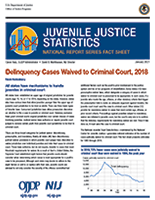Judges
A Quantitative and Qualitative Evaluation of the Impact of Arizona’s Ban on Peremptory Challenges: A Focus on Racial Bias in Jury Selection and Case Outcomes
In Their Own Words: The Impact of Indirect Trauma Exposure on Judges Presiding Over Cases Involving Minors Involved in Sex Trafficking
National Symposium on Sentencing--The Judicial Response to Crime: Instructor's Guide for Classroom Video
The Effects of Parental and Sibling Incarceration: Evidence from Ohio
Looking Up at the Ivory Tower: Juvenile Court Judges' and Attorneys' Perceptions of Research Use
Understanding and Characterizing Labor Trafficking Among U.S. Citizen Victims
Plea validity in circuit court: judicial colloquies in misdemeanor vs. felony charges
Booker and Beyond Analyzing Sentencing Reform and Exploring New Research Directions
This webinar features a discussion of previously published research on the U.S. Supreme Court’s 2005 Booker decision - which effectively transformed the United States Sentencing Guidelines from a mandatory, to an advisory, system. The presentation will address selected research findings from the last 15 years. Individual participants will briefly review their previous research findings with particular attention paid to the analytic methods used.
See the YouTube Terms of Service and Google Privacy Policy
The University of Alabama System and the Alabama Department of Forensics National Center on Forensics
Firearm Removal, Judicial Decision-Making, and Domestic Violence Protection Orders
Validation of a Confirmatory Proteomic Mass Spectrometry Body Fluid Assay for Use in Publicly Funded Forensic Laboratories
A Process and Impact Evaluation of Illinois' Policy to Eliminate Cash Bail and Reform Pretrial Practices
Court Decision-Making in Domestic Violence Cases: An Analysis of the Case Processing Pipeline in South Carolina
Strengthening data-driven pretrial release in New Jersey
AAAS Science & Technology Policy Fellowships
An Exploratory Study of Labor Trafficking Among U.S. Citizen Victims
National Judicial Reporting Program (Bureau of Justice Statistics)
From 1986 to 2006 the National Judicial Reporting Program (NJRP) collected felony sentencing from a nationally representative stratified sample of state courts in 300 counties. The information collected included: age, race and gender of persons convicted of an offense; dates of arrest, conviction and sentencing data; mode of conviction and type of sentence imposed. Data were collected every 2 years during this time period.
Study Revealed Safe Harbor Laws Increased Protections for Sex-Trafficked Youth, Identified Needs for Agency Support and Judicial Training
A study of Kentucky’s safe harbor laws revealed they have helped decriminalize sex-trafficked youth. However, the study also highlighted a lack of resources and training for child welfare personnel and judges who work with these youth.
Study Revealed Safe Harbor Laws Increased Protections for Sex-Trafficked Youth, Identified Needs for Agency Support and Judicial Training
Dual System Youth: At the Intersection of Child Maltreatment and Delinquency
Across the country, child welfare and juvenile justice systems now recognize that youth involved in both systems (i.e., dual system youth) are a vulnerable population who often go unrecognized because of challenges in information-sharing and cross system collaboration. In light of these challenges, national incidence rates of dual system youth are not known.
See the YouTube Terms of Service and Google Privacy Policy




